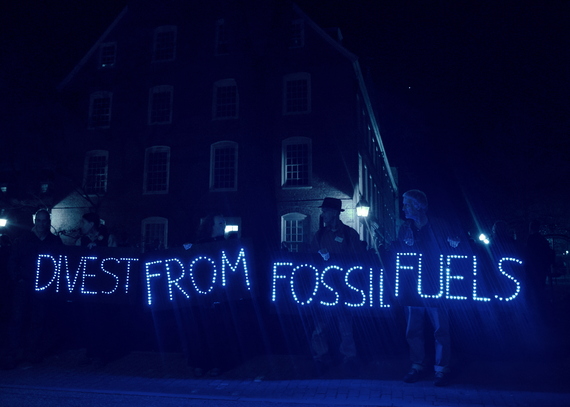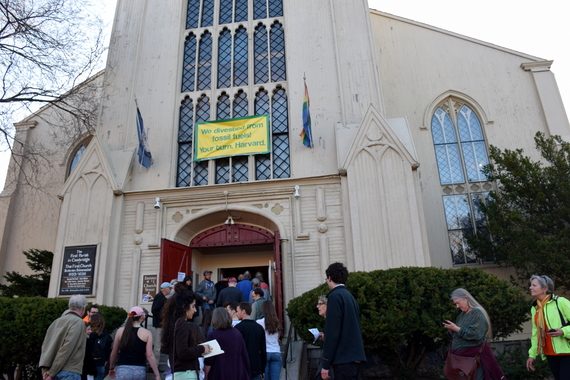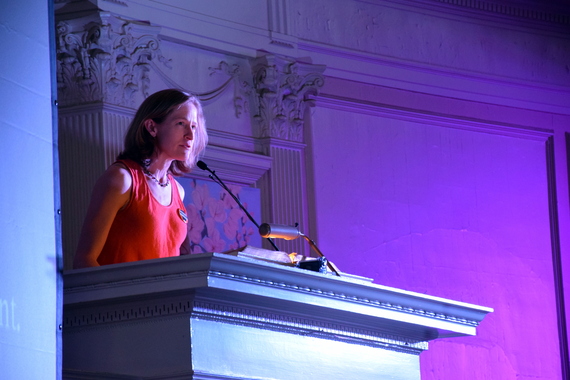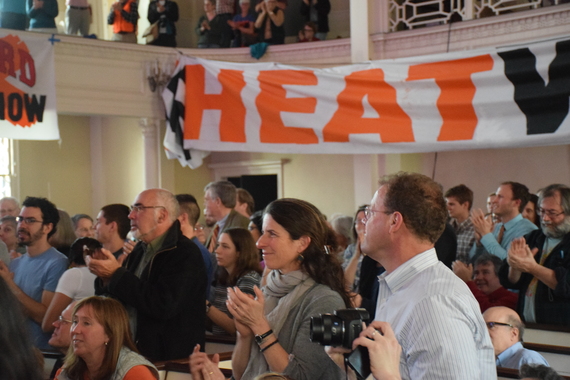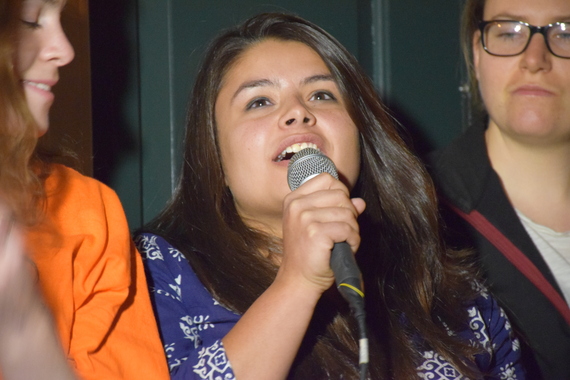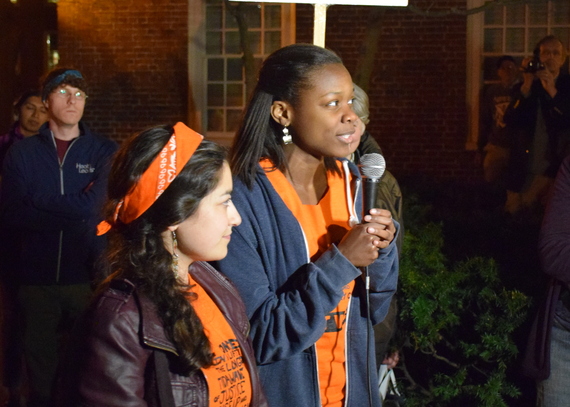Hundreds of students, alumni, faculty and community members joined forces in Harvard Yard on Sunday night to launch "Harvard Heat Week," a weeklong sit-in for fossil fuel divestment. As of 11:00 p.m., dozens of students and supporters were still blockading the doors of Massachusetts Hall, where Harvard President Drew Faust will show up for work on Monday.
The action began earlier in the evening at the First Parish Church of Cambridge, across the street from the university. Hundreds of people filed into the historic building, under a banner hung on the steeple that read, "We divested from fossil fuels! Your turn, Harvard."
"We're on a roll," said 350.org founder Bill McKibben, who took the stage to thunderous applause after an opening song from Reverend Fred Small, who'd opened his house of worship for the event. McKibben ticked off a series of recent wins for the divestment movement: Syracuse University, the Guardian Media Group, the Rockefeller Brothers Fund. And he pointed to the growing number of sit-ins on college campuses across the country, from Yale to Swarthmore to Berkeley.
Over the course of the night, a series of speakers, many of them Harvard alumni or students, fired up the crowd with calls for divestment.
"It astounds me that this university that has such a great commitment to teaching and research has not seen it necessary to coordinate their investment policy with that work. It is remarkably hypocritical," said former U.S. Senator Tim Wirth, who 27 years ago convened the first Congressional hearings on global warming, and has long served on a variety of Harvard's boards and councils. "The demand for change is absolutely imperative."
His daughter, Kelsey Wirth, a Harvard alumnus and the founder of the organization Mothers Out Front, told the crowd:
Our trust in Harvard is broken. In the face of the climate crisis, Harvard is profiting from the same companies that are undermining the scientific knowledge that is being advanced by this university.
"Fair Harvard has always wrestled with unfair Harvard," said another Harvard alum, Todd Gitlin, who went on to the first President of SDS and is now the chair of the PhD program in communications at Columbia University. "But with the non violent power of reason and passion, we shall overcome."
The evening resounded with echoes of the campaign against apartheid South Africa that eventually led to 155 colleges and universities in the United States to divest. Harvard was one of the holdouts: the university resisted calls for divestment for over a decade, before passing a partial divestment policy. The school never fully purged its holdings.
"In South Africa, we start our speeches with the phrase 'Amandla!'" said Ferrial Adam, 350.org's Africa and Arab World Team Leader, who fought against apartheid as a young girl. "It means, power to the people. And that's what we need now... Just as divestment from apartheid was about fundamental human rights, so is divestment from fossil fuels."
"When I was a student back in the 1980s we were trying to get Harvard to divest from apartheid. It's amazing how similar that fight was to the fight today," said director Darren Aronofsky, who spoke at the evening rally and then headed over to campus with the crowd to film the sit-in. "To us it was always as clear as day who was on the right side of history."
Bob Massie, who wrote a book on the anti-apartheid divestment effort, reflected on the successes of that campaign and reminded the crowd of the impact that an institution like Harvard could have on the political debate. "Tonight, we are standing across the street from one of the most powerful and influential institutions in the world. An institution whose leaders have sadly forgotten why they were entrusted with leadership." Echoing another anti-apartheid leader, he chided the university for that failure to lead, saying, "Harvard sleeps on, and occasionally it talks in its sleep, expecting the oil companies to listen."
Speakers also connected the divestment campaign back another historic social movement: the fight for civil rights in the United States. Jibreel Khazan, who took part in the famous lunch counter sit-ins in Greensboro, NC, sat in the front row to cheer on the students preparing to sit-in at Harvard. "Climate justice is our lunch counter moment for the 21st century," said Reverend Lennox Yearwood of the Hip Hop Caucus, who introduced Khazan. "He is here to pass the mantel."
The students were clearly ready to take it up. "Harvard's inaction is providing safe cover for those reluctant to change the status quo," said Ted Hamilton, a student at Harvard Law School and organizer with Divest Harvard.
As Harvard students, we think our university's reputation can be used to create positive change, not just harmful passivity... By raising the temperature of debate on campus, we expose the gap between the values of our institution and their actions.
Harvard won't divulge all of the investments in its over $36 billion endowment, but there is little doubt that it holds hundreds of millions of dollars in fossil fuel companies. According to recent SEC filings, that only cover a fraction of Harvard's investments, the university increased its holdings in publicly traded oil and gas companies by a factor of seven in 2014. President Faust has repeatedly said the university will not divest, but would rather "engage" with companies to improve their environmental behavior. So far, Harvard has not provided any explanation of what that engagement has looked like, or whether they've had any success (unlikely).
"We were up against institutional inertia, plain and simple," said Talia Rothstein, a Harvard sophomore and Divest Harvard member.
What we face today is not just a problem of persuasion, but a question of how to shake Harvard out of its century's old institutional slumber...Together we will turn Harvard Yard into a site for collective action and a platform from which we will demand a more just planet.
That demand is clearly being heard around the world. Koreti Tiumalu, 350.org's Pacific Coordinator, shared a message of solidarity from islanders from across her region."The Pacific islands and the fossil fuel industry can't coexist, and Pacific Islanders won't back down...For the students, alumni and everyone who is fighting this fight, the Pacific Climate Warriors are with you."
Urged on by music by the local Boston band, Melodeego, the crowd surged out of the church and across the street to Harvard Yard, where students had already started blockading the doors of the Massachusetts Hall administrative building. People sang, listened to additional speakers, and shared stories, as the university police watched on. It's still unclear if they'll let the sit-in continue throughout the week or start arrests in the morning, when President Faust and other administration officials start heading into work.
But just a few hours into the protest, students, alumni, faculty and activists have made their point: The Harvard community supports divestment, and it's time for the university to act. If it's wrong to wreck the planet, than it's wrong to profit from that wreckage. As Desmond Tutu said during the anti-apartheid fight, "We are not asking you to make a political decision. We're not asking you to make an economic decision. We're asking you to make a moral decision."
Until the university makes the right call, Divest Harvard and its allies will continue to turn up the heat. Solidarity rallies are scheduled throughout the week at 10:00 a.m. and 8:00 p.m. each day this week. On Friday, community members are encouraged to turn out for a closing rally at 6:00 p.m.
Harvard Heat Week is just getting started.

